Guest Post by John Wilder
“I learned of a place where a man can be free. Free to do what he wants to do. Free to ketchup his eggs without being hassled by the man.” – Strong Bad
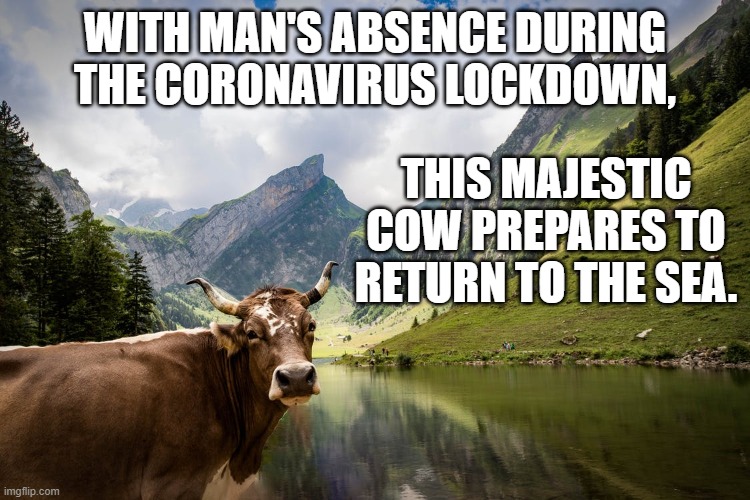
My father-in-law raised dwarf dairy cows for a while. They gave condensed milk.
Almost everyone reading this post has lived a life of nearly unthinkable abundance. Did we have everything when we wanted it?
No.
Did we sometimes go without?
Yes.
Did we have to make tough choices because our primary liquid assets included some string, an empty PEZ® dispenser, a coupon for 2 for 1 taquitos at Sven’s Taco Hub, three cases of returnable Coors Light® bottles and a bank account with $3.17 in it?
Yes, though I guess that might be suspiciously specific.
Even as our individual economic conditions may have changed, we have lived in societies of amazing abundance. At no point in history have so many people been fed to the point that, rather than having too little food, the main food-related problem in the world is that we’re too fat. I can expect that this sort of conversation could have been had with most of our ancestors throughout history if we took them for dinner at a modern restaurant:
John Wilder: “Hey, slow down! You don’t want to get obese.”
Ancient Wilder Ancestor: “Obese, what’s that?”
John Wilder: “It’s where you eat too much food.”
Ancient Wilder Ancestor: “Sounds great. Let’s get obese.”
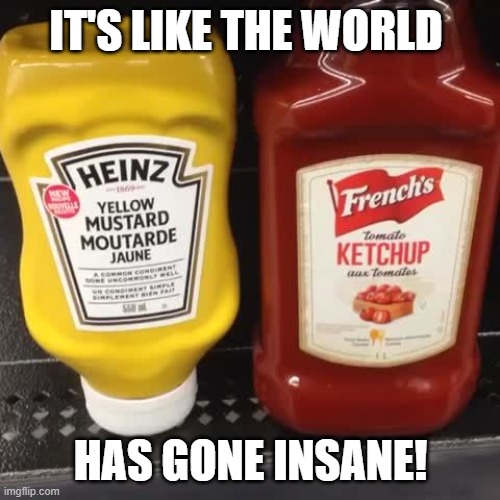
The Mrs. asked me to put ketchup on the shopping list, and now I can’t read any of it.
The modern grocery stores have suffered not from a lack of products, but have an amazing variety of choices. In the ketchup section here in Modern Mayberry, there are no fewer than 21 different options (including different sizes) for ketchup. It’s a literal wall of ketchup: spicy, organic, no fructose, already mixed with mayo . . . the list goes on. I looked it up – a good blogger always checks his sauces.
When I was growing up, there were just four choices if you wanted ketchup: Hunts® or Heinz™, and you got to pick the little bottle or the big bottle. That was it, and in my imagination the only people that would pick Hunts© ketchup were trolls that lived under bridges or that couldn’t afford the tasty goodness of Heinz®. We can have so many choices because while the 1970’s Modern Mayberry was served by two small grocery stores, today it’s served by a Wal-Mart® that has a food section that’s nearly double in size to the grocery stores of the 1970’s.
We have an abundance of choices today.
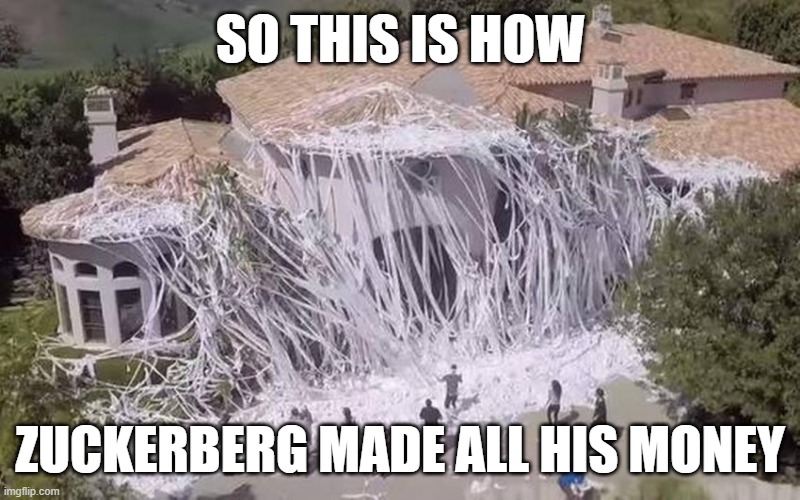
And I thought it was just people’s data he was interested in.
What does the world look like in a world of shortages? I think most people can’t even understand what a world like that might look like, but they are beginning to get glimpses. The toilet paper shortage was so odd a start to COVID-19 shenanigans that it could have almost been written by a comedy writer for a humorous end of the world movie. Me? I hope that if the end of the world happens, it starts in Las Vegas, because, you know, maybe it will stay in Vegas?
The toilet paper shortage didn’t impact us, because we generally have an inventory of two or three months’ worth of toilet paper on hand at any given moment. Why? I don’t like to run out of things. It’s the same reason I have spare ketchup in the pantry and a socket set and jumper cable in every car. I don’t like to let inconveniences become emergencies.
But the prospect of running out of toilet paper became very real for millions of Americans. And it showed many people for the first time what a shortage was. It wasn’t like the brand of ketchup you wanted was too expensive, it was that there was no ketchup at all. And no schedule of when there would be ketchup. And a line of people panicking about ketchup and buying cases of ketchup because they had heard ketchup was in short supply.
I imagine that people who bought a lifetime supply of toilet paper during the shortage feel a bit silly. But it’s really a great illustration about how the human mind works in periods of low information. If everyone knew that the toilet paper supply network was robust, then there would never have been a shortage. So, that was a short-term shortage caused by panic and lack of information. I mean, it’s the 3-2-1 rule of New Preppers: A three dollar first aid kit, two days’ worth of food, and one year’s worth of toilet paper.
But what about longer term issues?
Farmers have plowed vegetables back under into the soil because there was no way to get them to market. People who have hens to produce eggs have destroyed hundreds of thousands of eggs at the same time my local Wal-Mart® was out of eggs. Why? They produced the eggs for the restaurant industry, and there wasn’t a way to package them for individual sales. It’s like the inverse of communism: there’s too much food and the system is performing too well.
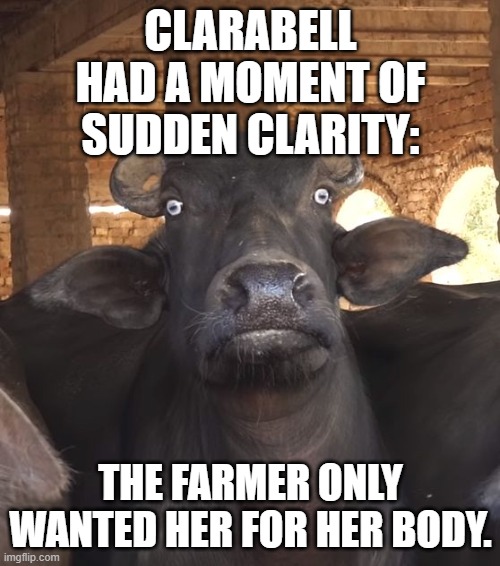
Cows have hooves instead of feet. They lactose.
Will that happen with cattle? I don’t think people will slaughter cattle on a whim, but the entire system is now partially locked up because meat packing plants are shutting down because of the WuFlu. But even that is a short term problem, since cattle that were going to go off to the feedlots to be prepped for the packing houses . . . aren’t. This will result in beef prices going up (not enough packing plant capacity), then dropping (lots of cheap cows), and then going up again (cows that should have been put in the pipeline . . . weren’t).
Today my daughter, Alia S. Wilder called me. She was spooked about beef. “Should I be concerned? Should I look for alternate sources of protein? What should I do? I saw row after row of empty shelves in the meat department.
“Are we going to be okay?”
Those were good questions, and if Alia is asking them, then you can bet millions of other people are, too. Even though I feel that the meat shortages are (for now) a short term ripple of the Coronavirus Economy®, I sense that people are getting the idea that at least some of the short term shortages we’re seeing now will build into long term shortages. Maybe not with toilet paper. Maybe not (for now) with beef. But people are worried that it will be real with something, and soon. And we’re certainly not going to have a shortage of toilet paper jokes.
What happens when we have real shortages because the systems that we relied upon to create the fabulous wealth in the West are irreparably broken because of the economic strains we’ve put on them?
We can look back on a real case study: Germany just after World War I. At the end of World War I, Germany had collapsed like my cat Rory on the surface of a neutron star. The Allied blockade had effectively starved the German people, and chaos was in the air. Their royalty, Kaiser Wilhelm had given up the throne for the life of a carnival worker who ran the “guess your age and weight” booth. A new government was formed, and became known as the Weimar Republic.
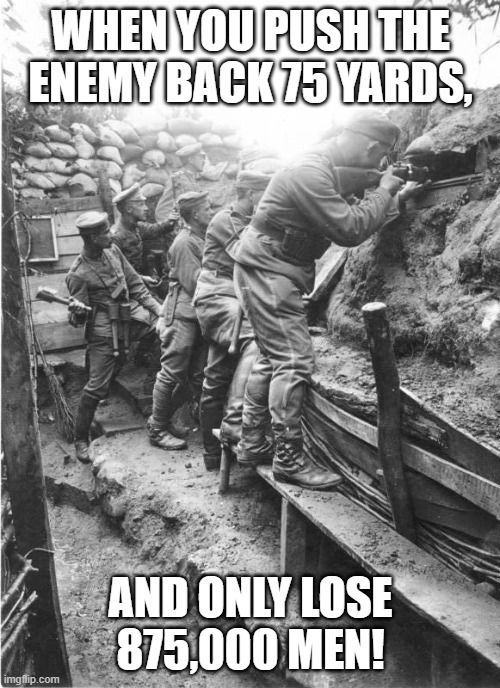
Go sightseeing in France they said. Home by Christmas they said . . . .
In 1919, this government’s first job was to “negotiate” the Versailles Treaty. In actuality, the treaty was dictated to the Germans, who had little leverage. Their army had been disbanded, and the Allied food blockade stayed in place during the negotiations, so Germany was ready to sign anything, no matter how bad the conditions.
The conditions were bad – the German reparations required by the treaty were huge, more even than the $257 billion (equivalent in today’s dollars) they had actually paid by 1932. One response was to set up a two-tiered currency system – one backed by gold, and one not backed by gold. However, the war reparations payments set by the Versailles Treaty had to be backed by gold, so Germany couldn’t just print their way out of those payments.
But they could print their way into poverty. They used the German marks not backed with gold to buy goods overseas. The nice thing about that (if you were German) was that you could just print those marks. Then? Free stuff.
Until it wasn’t free stuff. The impact was significant. In 1921, $1 would buy you 150 German marks. Two years later, that same $1 would buy you over 25 billion marks. The result was perverse: the Germans had no idea how to stop the hyperinflation. People had become used to it and the government was worried that if they stopped hyperinflating the currency, then the whole system would collapse.
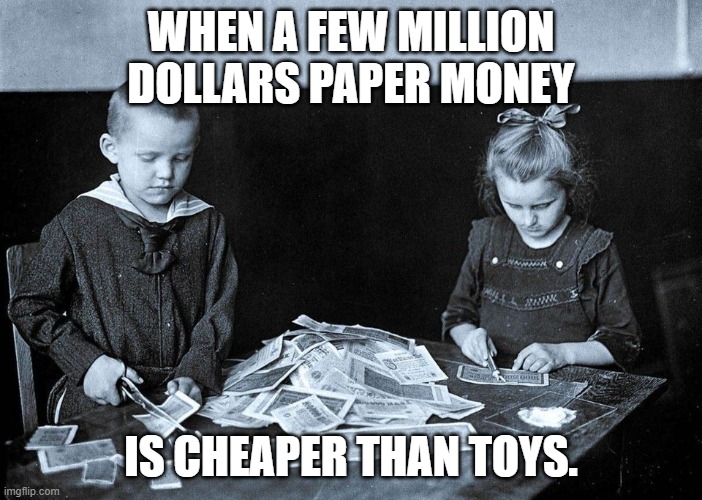
One story I heard was that a man had a wheelbarrow full of money he left outside a store. When he got back, someone had stolen the wheelbarrow and left the money.
Germany at that time was an odd place – the factories and farms still existed and all of the physical things required for production were there. There was still food in the stores, but there was hunger and destitution everywhere: money had ceased to be of value. The nonsense of hyperinflation ceased when the adults took over the printing presses and sliced 12 zeroes off of the value of their paper currency. Since the money was pretend in the first place, the number of zeros is like Beto O’Rourke’s political opinion in Oklahoma: nearly irrelevant.
I don’t expect that we’ll have Weimar America, but then again the Germans didn’t expect hyperinflation (or the Spanish Inquisition) back in 1921. Thankfully, we haven’t been through a loss in a devastating war and starvation and the collapse of our government. But it’s entirely possible that whole categories of stores and even products will disappear. It’s also entirely possible that the money printing we’re doing in such a big spurt will have a significant impact on prices, squeezing our economy and the world’s economies in ways that we can’t yet understand.
But what I really expect is that we’ll find out soon enough that we can’t print our way to abundance. Whereas the physical world hasn’t changed much with COVID-19, the systems of companies and people that work together to create and distribute something as simple as a hot dog, hot dog bun, mustard and ketchup (yes, I’m one of those) have to work together with all of the harmony that communists imagine only comes from communism. It takes thousands of people and a dozen companies to prepare such a simple feast.
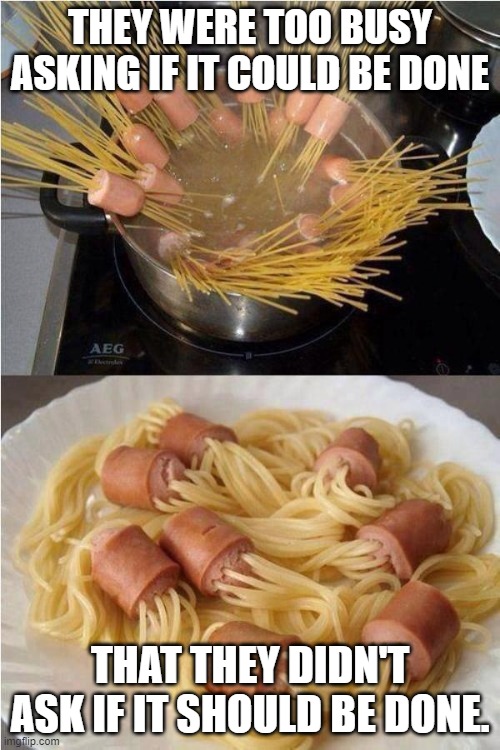
Cast out this abomination!
Coordination of that type takes place naturally in a capitalist system that’s running well. The hot dog maker doesn’t have to coordinate with the bun maker – bun makers make what they can sell, and then buy flour from flour mills. Who buy wheat from farmers. Who buy fertilizer . . . and you see I could keep this chain going forever. The world is a web of interconnections. When normally self-correcting systems are first deprived of money, then flooded with it, systems and signals break down.
And our world of abundance goes with it unless we have those signals that prices and orders give. I hate to promise this, but I am certain when I say that we haven’t even scratched the surface of the strange things we will see in the next few years.
But one thing I don’t think we’ll see in a year: our previous world of limitless abundance and shelves filled with 21 different kinds and sizes of ketchup. I mean, who even buys Hunts®?







Not Theresa Heinz Kerry.
We’re not all that far from Weimar now. Give it a couple years.
covid 19 can be the start for repentance.
the true betrayal of the people of the world, is outlined here.
its the bombshell to end all bombshells, once you understand it.
[youtube
This article nails it.
The spaghetti-thru-the-hotdog thing still has me a little rattled.